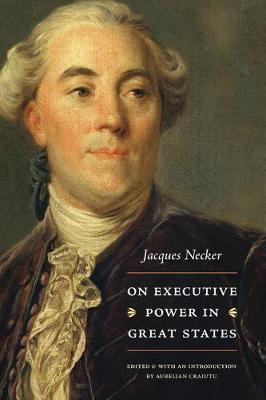On Executive Power in Great States

On Executive Power in Great States
Jacques Necker (1732-1804) was a Swiss statesman and financier who played a crucial role in French political life from 1776 to 1789. Born in Geneva, he was a devout Protestant who amassed considerable wealth as a successful banker. In October 1776, he was appointed as director of the Royal Treasury and, later, in June 1777, as director general of finances of France under Louis XVI. While in charge of the finances of the kingdom, his most famous decision, in 1781, was to make public the budget of France for the first time, a novel practice in an absolute monarchy. His work On Executive Power in Great States (1792) is arguably one of the most important texts ever written on the issue of executive power in modern society. It includes memorable formulations regarding liberty and public spirit among the English and the Americans, the relation between economic prosperity and political freedom, and the seminal influence of religion and morals on liberty. Necker provides a defense of representative government and offers an examination of the French political system, which he compares on several occasions with England and America. Before Tocqueville, Necker understood the importance of America for the Old World as the first successful example of popular self-government and free institutions. In his book, Necker called upon French legislators to study the principles of the U.S. Constitution. His bold innovation was to replace the theory of the functional separation of powers with the "intertwining of powers" that were dependent upon the existence of effective links between the executive and the legislative. In the absence of such links, Necker maintained, "all would be contest and confusion." Necker's fundamental premise was that it would be impossible to establish effective cooperation between different powers solely through the exercise of constant watchfulness and mutual distrust. Although Necker was one of the most important politicians in France before and during the French Revolution, he has been largely ignored as a political thinker. This is the first modern edition of Necker's important work, shedding fresh light on the timely topics of executive power, constitutionalism and the rule of law, federalism, balance of power, and the dependence of liberty on morality and religion. Professor Aurelian Craiutu significantly revised and corrected the 1792 English translation and added explanatory notes, an introduction, and a select bibliography. Aurelian Craiut
PRP: 104.88 Lei
Acesta este Prețul Recomandat de Producător. Prețul de vânzare al produsului este afișat mai jos.
83.90Lei
83.90Lei
104.88 LeiIndisponibil
Descrierea produsului
Jacques Necker (1732-1804) was a Swiss statesman and financier who played a crucial role in French political life from 1776 to 1789. Born in Geneva, he was a devout Protestant who amassed considerable wealth as a successful banker. In October 1776, he was appointed as director of the Royal Treasury and, later, in June 1777, as director general of finances of France under Louis XVI. While in charge of the finances of the kingdom, his most famous decision, in 1781, was to make public the budget of France for the first time, a novel practice in an absolute monarchy. His work On Executive Power in Great States (1792) is arguably one of the most important texts ever written on the issue of executive power in modern society. It includes memorable formulations regarding liberty and public spirit among the English and the Americans, the relation between economic prosperity and political freedom, and the seminal influence of religion and morals on liberty. Necker provides a defense of representative government and offers an examination of the French political system, which he compares on several occasions with England and America. Before Tocqueville, Necker understood the importance of America for the Old World as the first successful example of popular self-government and free institutions. In his book, Necker called upon French legislators to study the principles of the U.S. Constitution. His bold innovation was to replace the theory of the functional separation of powers with the "intertwining of powers" that were dependent upon the existence of effective links between the executive and the legislative. In the absence of such links, Necker maintained, "all would be contest and confusion." Necker's fundamental premise was that it would be impossible to establish effective cooperation between different powers solely through the exercise of constant watchfulness and mutual distrust. Although Necker was one of the most important politicians in France before and during the French Revolution, he has been largely ignored as a political thinker. This is the first modern edition of Necker's important work, shedding fresh light on the timely topics of executive power, constitutionalism and the rule of law, federalism, balance of power, and the dependence of liberty on morality and religion. Professor Aurelian Craiutu significantly revised and corrected the 1792 English translation and added explanatory notes, an introduction, and a select bibliography. Aurelian Craiut
Detaliile produsului









